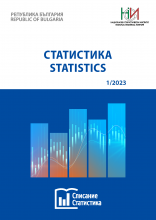The National Statistical Institute informs the users of statistical information that issue 1 for 2023 of the ‘Statistics’ journal is published on the NSI website. The publication is in Bulgarian with summaries in Bulgarian, English and Russian and includes the following rubrics:
• Development of Modern Statistical Theory and Practice
• Statistical Research and Data Analysis
• Business intelligent systems and artificial intelligence
• Statistics for everyone
The Development of Modern Statistical Theory and Practice rubric includes the article ‘The material on Probability and Statistics in mathematics curriculum for secondary schools’ by prof. Marta Sugareva. The article suggests changes to middle school math curricula, particularly in their ‘Probability and Statistics’ section. The goal is to increase the quality and efficiency of education in this discipline, which will lead to an increase in the statistical culture of the population. The emphasis is on the 5th, 6th, and 7th-grade curricula when basic concepts of statistics are introduced and students are introduced to the statistical approach to research.
The Statistical Research and Data Analysis rubric includes the article ‘Impact of the Minimum Unconditional Basic Income on Incomes: Opportunities, Analysis and Results’ by Vassos Psaropoulos, a PhD student at the Faculty of Economic and Social Sciences of the ‘Paisii Hilendarski’ University of Plovdiv. It presents the different types of basic income and the impact of basic income Social Dividend (SDI) on incomes, poverty and inequality based on the results of research.
The Business Intelligent Systems and Artificial Intelligence rubric contains the article ‘Extracting valuable information from web sources of real estate data - NSI’s experience as part of the Web Intelligence Network (WIN)’ by Dr Galya Stateva, state expert at the ‘Planning and Quality of Statistical Surveys’ Department, NSI and Kostadin Georgiev, chief expert in the ‘Information Systems and Applied Software’ Department, NSI.
The authors present the challenges of applying Natural Language Processing (NLP) to web data from online real estate listings in order to extract valuable information that can be used as a supplemental source for official statistics. The present study is part of the experimental use cases within the ESSnet WIN project, the main objective of which is to explore the possibility of creating new and extending existing statistics through the European platform - Web Intelligence Hub (WIH).
Keywords: web data, web sources, real estate, web scraping, WIH, trusted smart statistics.
The rubric Statistics for everyone includes the following articles:
- ‘Manipulative presentation of information about benefits and risks, or how a fly is made into an elephant’ by Assoc. Dr Margarita Lambova, University of Economics, Varna, and Dr Vanya Stoyanova, Ch. assistant professor, University of Economics, Varna.
In the presented scientific study, different ways and dimensions of measuring benefits and risks are considered. The essence of the concepts of ‘number blindness’ and ‘foggy thinking’ is revealed. The aim is to reveal ways of manipulative presentation, as well as problems in the perception and interpretation of information about the benefits and risks of certain actions. Assumptions are made about the inability of individuals to distinguish between absolute and relative changes, which allows for manipulation. Formulated assumptions are verified based on a simple study.
JEL: C10, I21
Keywords: benefits and risks, absolute and relative risk reduction, numerical information.
- ‘Statistical Aspects of Nomophobia’.
This interesting and current topic is developed by Stefania Koycheva - a student in the 10th grade, ‘Vasil Levski’ Secondary School - Troyan and the Team51 team, consisting of Adriana Ilieva, Anna Popova and Georgi Nikolov, students from 51 ‘Elisaveta Bagryana’ Secondary School - Sofia, headed by Eng. Diana Savova - lecturer in Information Technologies.
The material reveals how in the digital age, when technology occupies a large part of people’s lives, it becomes increasingly difficult to imagine a world without computers, the Internet, tablets, mobile phones and others. The constant use of mobile devices leads to a new addiction called ‘nomophobia’ - fear of being without a phone (NO-MObile-phone PHOBIA) or away from it. This study highlights the main characteristics of nomophobia, derived from worldwide studies, aiming to show to what extent this phenomenon affects people, what is its reflection on the psyche, what are its symptoms, etc. The data presented by Eurostat and the National Statistical Institute help to study the new addiction in more depth, as there is still not enough information about it. An important part of the research is to trace the extent to which the fear of being without a phone affects people of all ages, what harm it can cause to health, and to find a way to use mobile devices responsibly by creating a balance between using technologies and doing other 'offline' activities.
The issue can be found on the ‘Statistics’ journal page on the NSI website.



